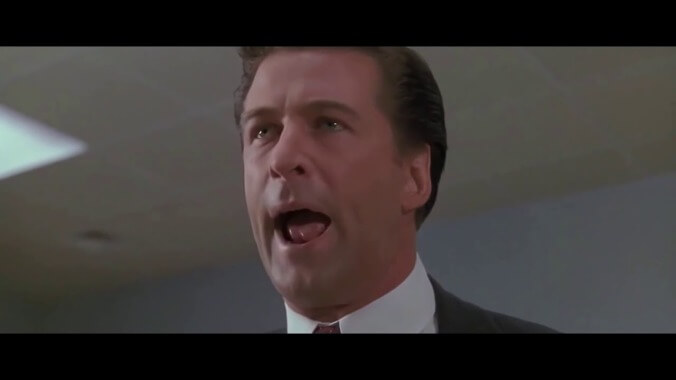Why Glengarry Glen Ross’ Alec Baldwin scene is so unusual

“Forget about the novel—I haven’t read the novel—my main strength is that I haven’t read the novel—the novel is killing you.”
That’s future Bourne Legacy director Tony Gilroy bellowing at screenwriter William Goldman (as reported by Goldman) about the screenplay for 1996’s Absolute Power. Goldman was badly stuck at the time, torn between his desire to remain faithful to the source material—a pop thriller by David Baldacci—and the structural constraints of a commercial movie. And Gilroy, a superb screenwriter himself (Michael Clayton, Duplicity), was exactly right. In adapting any written work to the screen, creators have to give fidelity the heave-ho at some point and craft something intrinsic to the new medium; attempting a direct translation will result in a moving FotoNovel, as Chris Columbus so unmemorably demonstrated with Harry Potter And The Sorcerer’s Stone. Often, such departures will involve eliminating entire characters and subplots, shifting locations, combining elements, condensing like mad. But they can also entail dreaming up entirely new material—material that’s (hopefully) in the spirit of the original, but with a distinctly cinematic component.
And then there’s the movie version of Glengarry Glen Ross, which as far as I know is unique in the annals of film adaptations. David Mamet’s two-act play, first staged in 1983, won the Pulitzer Prize and remains a classic of contemporary theater, soon to be revived yet again on Broadway (with Al Pacino, who played Ricky Roma in the film, now in the role of Shelley Levene). Mamet adapted the screenplay himself, and it’s almost a word-for-word transcription, though the first act’s three discrete scenes are now intercut. Yet the most famous, most quoted, most popular scene in the movie doesn’t exist in the play. Mamet was forced to create it, I believe, along with a few other additions, because the play is unusually short, even by theatrical standards. (According to legend, he sent the completed draft to Harold Pinter, with a note saying that it seemed finished, but was a wonky length, and asking for guidance. Pinter’s reply: “It’s perfect. Stage it.”) Has this happened before or since—a world-famous author upstaging his own hugely acclaimed source material with a bit of new material devised expressly for the movie? The scene is too long to show here in its entirety, but here’s the majority of it, just in case your day needs a little sadistic invective.
